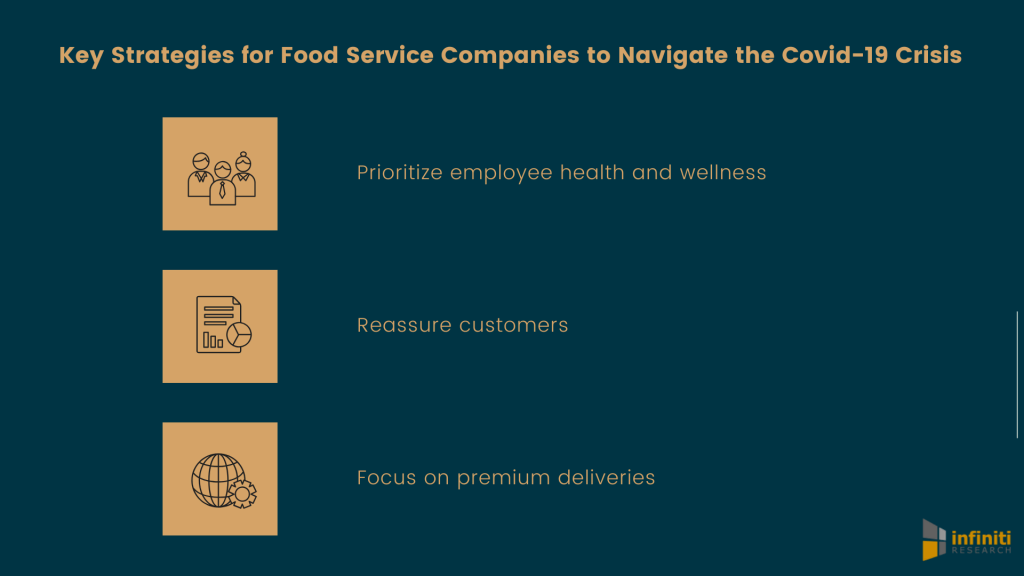As the coronavirus continues to spread worldwide, restaurants and food services companies are affected in various ways. With major countries having declared a state of emergency, closure of non-essential businesses, and social distancing, the food service industry sales are down by around 80%. While few restaurants are able to maintain normal revenues by providing meals via takeout and delivery options, others are still confused on whether to choose to remain open or close temporarily. For restaurants to survive during the coronavirus crisis, they will need to find creative solutions and adapt to customers’ plight. As customers are more budget-conscious these days, one strategy for restaurant owners to consider is creating new discounted entrees. Also, adding healthy food items to the menu can help attract new customers.
In this article, our experts have outlined key strategies for companies in the foodservice industry to navigate the covid-19 crisis.
Key Strategies for Food Service Companies to Survive the Coronavirus Crisis

Prioritize employee health and wellness
Today, restaurant businesses are encountering labor shortage challenges and high turnover rates, compelling restaurant owners to focus on keeping their staff safe and healthy. In the middle of such an escalating health crisis, food service companies will need to connect with their employees and try to understand their needs. This can be done by implementing an EAP (employee assistance program) process. Also, small restaurants can choose to partner with a third-party service provider and ensure business continuity by providing home delivery options. While others can choose to offer paid sick leave and build trust of employees. Moreover, food service companies should ramp up cleaning processes to ensure the safety of customers as well as their employees. This can be done by installing hand sanitizing stations, installing sanitary door openers on washroom and kitchen doors, sanitizing POS systems, and many more.
We can help you to scale up your business and ensure business continuity. Request a FREE proposal here.
Reassure customers
As retaining customers are highly imperative for continuity of business operations, food service companies will need to efficiently communicate with their valuable customers regarding changes they may be making, share sanitization procedures, and encourage support. Any mode of communication such as website, social media, customized emails, and marketing advertisements can be used for the same. Of all these, targeted marketing campaigns can help companies in the restaurant business to reach out to the audience with personalized messages.
Analyzing past customer data and providing valuable customers with a reward or discount can help food service companies to retain valuable customers and increase online orders. Also, as customers are now looking for budget-friendly meals, restaurants must scale up menu and look for new ways to reduce operating costs. Besides, offering an all-day breakfast and brunch menu can generate more business as most people are working from home.
Understand the CARES Act
As the coronavirus cases are increasing in the United States and impacting the operations of businesses across various sectors, the US federal government passed a stimulus bill, called the Coronavirus Aid, Relief, and Economic Security Act (CARES). The CARES act ensures to provide financial support for small and medium-sized businesses through a lending program. Besides, the policy provides aid for the healthcare system and ensures federally guaranteed loans to small businesses.
In addition to this Act, the US government is providing lower-interest loans called the economic injury disaster loan (EIDL) to businesses impacted by the coronavirus outbreak. As the government is looking to support businesses through various plans, food service companies must keep pace with these policies and utilize them at times of need.
Manage profits
The coronavirus outbreak has created a sharp downturn for companies in the food service industry, compelling many restaurants to close temporarily. To manage profits and maintain productivity during this period, food service companies will need to understand the impact of the coronavirus outbreak in their business operations. The next step involves making most out of the current inventory and reducing wastage of ingredients. Besides, food service companies must focus into increasing average check size and negotiating better deals with suppliers. In addition to this, companies in the food service industry can add an additional third-party delivery system or adapt menu to optimize for online delivery.
Look for financial support
During this critical time, some lenders and companies are offering hardship allowances. So, companies in the foodservice industry can consult their lenders for allowances in rent and other utilities. Also, the US restaurant workers community foundation is providing low-interest loans for companies in the restaurant industry. As such, restaurant owners can make use of such offers to bring back the business to normal condition post-covid-19.
Focus on premium deliveries
Recent studies show that millennials and Gen Z customers are showing preferences for budget-friendly meals, but also for enhanced experiences in delivered food. As such, the trend for chef-led delivery brands is expected to pick up over the coming weeks. As such, companies in the foodservice industry can focus on providing customers with higher quality food cooked in cloud kitchens.
Want to gain more insights into our services for companies operating in the foodservice industry? Request more info here.



